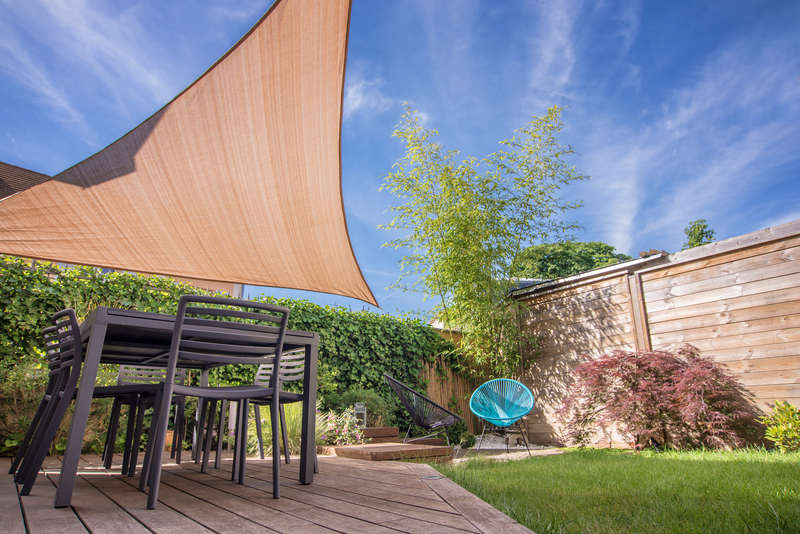Cultivate Peace: Enhance Your Outdoors with Zen Garden Concepts
Posted on 27/06/2025

Cultivate Peace: Enhance Your Outdoors with Zen Garden Concepts
Are you seeking a serene oasis right outside your door? The ancient practice of Zen gardening offers not only a feast for the senses but also a profound sense of tranquility and refuge from our busy modern lives. In this comprehensive guide, we'll explore how to cultivate peace and transform your outdoor space using Zen garden concepts that harmonize mind, body, and nature.
- What is a Zen Garden?
- Benefits of Zen Gardens
- Essential Elements of Zen Garden Design
- Choosing the Perfect Location
- Step-by-Step: How to Create Your Own Zen Garden
- Inspiring Zen Garden Ideas for Outdoor Spaces
- Caring for & Maintaining Your Zen Garden
- Zen Gardens for Small Spaces
- FAQs About Zen Gardens
- Final Thoughts: Welcome the Spirit of Zen
What is a Zen Garden?
Also known as karesansui or dry landscape gardens, Zen gardens originated in medieval Japan as tranquil spaces for meditation and contemplation. Unlike traditional Western gardens, Zen landscapes emphasize minimalism, simplicity, and balance. The iconic features--raked gravel symbolizing water, sparse rocks representing mountains, and carefully placed moss and plants--create a visual metaphor for the universe.
Zen gardens are meditation gardens at their core, designed to focus the mind, promote mindfulness, and encourage inner peace. Incorporating these peaceful elements into your outdoor living space enables you to retreat into calmness without leaving home.
Benefits of Zen Gardens
- Mental Health: Regular interaction with a Zen garden soothes anxiety, eases stress, and cultivates mindfulness.
- Visual Appeal: The harmonious arrangement of rocks, sand, and plants enhances the aesthetic of any yard or patio.
- Low Maintenance: Unlike lush lawns or flower beds, Japanese rock gardens require little water or upkeep.
- Meditative Practice: The art of raking sand and rearranging stones invites contemplation and creative expression.
- Connection with Nature: Zen garden concepts nurture respect and appreciation for the natural world.
In summary, Zen gardens for outdoor spaces not only beautify your property--they invite a mindful, peaceful rhythm into your daily routine.
Essential Elements of Zen Garden Design
Embracing Zen garden concepts means merging minimalism with meaning. Below are the foundational design components for crafting your tranquil retreat:
1. Rocks and Stones
- Symbolic Mountains and Islands: Strategically placed rocks reflect permanence and timelessness in Japanese Zen design.
- Balance & Asymmetry: Stones are grouped in odd numbers, establishing a natural flow and dynamic balance.
2. Gravel or Sand
- Representation of Water: Raked patterns in sand or gravel evoke rippling streams or ocean waves--a metaphor for calm waters.
- Contemplative Raking: Raking is not just aesthetic; it can become a meditative practice, focusing the mind and relieving stress.
3. Moss and Minimalist Plantings
- Touches of Green: Moss, groundcovers, and low shrubs add softness without overpowering the simplicity.
4. Pathways and Stepping Stones
- Journey and Guidance: Pathways guide the visitor, inviting a slow and thoughtful stroll through peaceful scenery.
5. Ornamental Features
- Water Basins and Lanterns: Traditional stone basins or lanterns add intimate focal points.
- Bridges or Bamboo Fences: Elements such as a red bridge or bamboo fencing bring authenticity and gentle visual boundaries.
Choosing the Perfect Location
Whether you have a sprawling backyard or a small urban patio, the core of Zen gardening is adaptability. Consider these site tips:
- Privacy: Select a quiet area, shielded from street noise or prying eyes with natural screens like hedges or bamboo.
- Sunlight: Moss and shade-loving plants prefer dappled sun, but sand and stone areas may fare better under full light.
- Level Ground: While Zen gardens can be adapted for sloped terrain, a relatively flat area is easiest for beginners.
- Accessibility: Situate your garden where you can enjoy daily rituals of maintenance and meditation.
Even a balcony or rooftop can be transformed with innovative Zen garden ideas--just scale down the essentials and favor container plantings or tabletop versions.
Step-by-Step: How to Create Your Own Zen Garden
Ready to cultivate peace at home? Follow this practical guide to enhance your outdoors with Zen gardens, whether you're a beginner or seasoned landscape designer:
-
Design Your Layout
Sketch a simple blueprint of your Zen landscape, indicating where to place rocks, sand, pathways, and any features such as lanterns or bridges. Take inspiration from traditional karesansui layouts, but let personal intuition and site conditions guide your plan. -
Prepare the Site
Clear existing grass, weeds, and debris. If forming raised beds or containing sand/gravel, outline the edges using wood, metal, or natural stones. -
Add a Weed Barrier
Lay down a breathable landscape fabric to minimize weed intrusion and simplify future maintenance. -
Arrange Stones and Rocks
Grouping rocks in organic, odd-numbered clusters creates harmony and movement. Bury portions of each stone to make them appear naturally embedded in the earth. -
Spread Sand or Gravel
Pour a 2-3 inch deep layer of white sand or pea gravel, ensuring an even, smoothed surface. This will serve as your raking canvas. -
Add Moss and Minimal Landscaping
Introduce moss, shade-tolerant groundcovers, or small pines sparsely. Avoid crowding; balance void space with living texture. -
Install Ornamental Features
Place a stone lantern, bamboo water spout, or simple bench for authenticity and meditation. -
Rake Designs into the Sand
Use a wooden rake to create flowing patterns--ripples, concentric circles, or zigzags--around rocks and open areas. Change your patterns seasonally, or as a calming daily mindfulness ritual.
Congratulations! You've established a foundation for enduring peace and beauty--one that matures with your care and creativity.
Inspiring Zen Garden Ideas for Outdoor Spaces
Modern gardeners are reinterpreting classic Japanese dry gardens to fit their lifestyles and environments. Discover these trending adaptations to enhance your own Zen-inspired outdoor retreat:
Miniature Tabletop Zen Gardens
Ideal for apartments or offices, these petite meditation kits feature tiny gravel, stones, and rakes on a tray--perfect for daily stress relief.
Zen Courtyards
- Walled Enclosures: Create a private world by encircling your Zen garden with bamboo, stone, or living walls.
- Water Features: While Karesansui gardens often omit water, a modest fountain or basin adds auditory tranquility.
Stepping Stone Walkways
Guide guests on a mindful journey past rock clusters and sand gardens using flat, stepping slabs spaced at irregular intervals--encouraging intentional, slow pace.
Moss & Fern Sanctuaries
For shady yards, focus on lush green moss, ferns, and smooth stones for a woodland Zen atmosphere.
Bonsai Displays
Sculpted bonsai trees evoke centuries of Japanese Zen gardening tradition and become living focal points among sand and stone.
Illuminated Zen Gardens
Install soft, indirect landscape lights or lanterns for a magical nighttime ambiance.
Caring for & Maintaining Your Zen Garden
A major appeal of Zen outdoor gardens is their minimal upkeep. To keep your sanctuary looking pristine:
- Occasionally Re-rake Sand or Gravel to refresh patterns and remove debris.
- Remove Leaves or Weeds promptly for a clean, meditative setting.
- Trim Moss, Shrubs, and Bonsai as needed to maintain size and balance.
- Clean decorative features or water basins to prevent algae.
Each maintenance act can become a mindful meditation in itself--a ritual for clarity and reflection.
Zen Gardens for Small Spaces
No yard? No problem! The principles of Zen garden design are highly flexible, making them perfect for:
- Pocket Patios--Transform a narrow strip with sand, a few river stones, and a single plant.
- Container Zen Gardens--Use large pots or troughs as miniature sand gardens with artful stones.
- Apartment Balconies--Opt for pebble mats, vertical moss gardens, and small bamboo screens for privacy.
- Window Ledges--Tiny trays with sand and pebbles offer immediate relaxation indoors.
Even the smallest space can be upgraded into a peaceful Zen-inspired retreat with creativity.
FAQs About Zen Gardens
- Are Zen gardens expensive to make?
Not necessarily! Most materials--sand, rocks, moss--are affordable. DIY designs can be adapted for almost any budget. - Do I need special skills to create a Zen garden?
No gardening or landscaping experience required--just a willingness to experiment and observe natural balance. - Is a Zen garden suitable for homes with pets or children?
Yes, but consider using larger stones, denser plantings, or slightly raised beds to prevent disruption. - Can Zen gardens be combined with other landscaping styles?
Absolutely! Blend them with native plants, succulents, or water features for a personalized outdoor sanctuary.
Final Thoughts: Welcome the Spirit of Zen
A peaceful Zen garden is far more than a design trend--it's a living practice, harmonizing nature and spirit. Through cultivating peace in your outdoor spaces with these time-honored concepts, you invite calm, clarity, and beauty into daily life.
Begin your journey today. Enhance your outdoors with Zen garden design ideas--and let every stone, every ripple in sand, and every leaf serve as a gentle reminder that peace is always possible, right where you are.

Latest Posts
Evergreen Climbers for Shade: From Dim to Dazzling with Greenery
Growing Green: Gardens as a Climate Change Countermeasure
Gardening Toolkit: Essentials for Outdoor Aficionados

